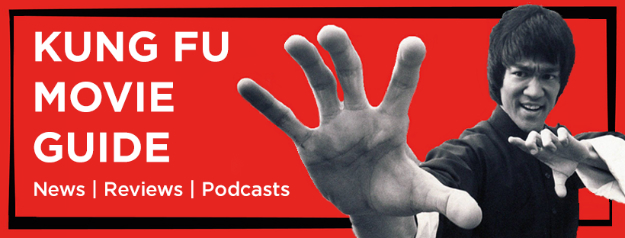
Hello and welcome to Kung Fu Movie Guide.
If you’re new here, here’s some guidance to help you navigate your way around.
Search: The best way to find what you’re looking for is the search option in the top right of the screen. This will filter through all reviews, interviews, profiles and tags to find the relevant information you’re looking for. The search results are listed according to the post date.
Titles: Many kung fu movies, like most exploitation films, have suffered at the hands of unscrupulous producers who can’t help but re-appropriate their products for different world markets or shifting trends. This can lead to all sorts of trouble, especially when you’re trying to find that Lo Lieh film you watched on late night cable television a few years ago. It might have been King Boxer, but the internet tells you it’s called Five Fingers of Death. The answer: they are both the same film. The latter is the American title.
Being UK based, the films on this website are listed under their most commonly accepted UK distribution title. Any alternative titles have been listed at the end of the reviews and will still be counted in search results. So even if you search for Master Killer you will still find the correct film review (which is 36th Chamber of Shaolin).
Years: A lot of kung fu movies – and ‘world cinema’ in general – tend to have different release dates around the world. Some release dates can actually be quite complicated. Let’s look at King Hu‘s A Touch of Zen, for example. We have listed the year as 1971 – the Hong Kong release date – although the film was initially released in two parts, the first part being released in Taiwan in 1970. To complicate matters further, the complete international release of the film debuted at the Cannes Film Festival in 1975, winning the Technical Grand Prize. So, do we use the international release date or its domestic release date? In all cases we have tried to include the film’s initial domestic year of release; when in doubt, we tend to go by what you will find on the Internet Movie Database.
Top Three: The three pull out movie posters on the home page display the three most recent reviews, although this is optional. It might just be whatever I fancy putting up there. Some kung fu movie posters are better than the film. Have you seen the one for Death Dimension? Honestly, look it up, you’ll see what I mean.
Twitter: Access the Twitter page either by the icon in the top right of the screen or by clicking on the Twitter handle on the right sidebar. You can follow us on @KFMovieGuide.
Facebook: Another way to keep up to date with Kung Fu Movie Guide is via the Facebook page. You can access this either by clicking the Facebook icon in the top right of the screen or by visiting facebook.com/kungfumovieguide.
Instagram: Yep, we’re on this too. Like, follow, regram and comment at this link: instagram.com/kungfumovieguide.
Newsletter: This is the best way to get exclusive access to any giveaways or competitions we might be running, and also a digest of the latest martial arts movie news. Simply enter your email address into the sign-up bar on the home page and become a registered Fu follower today!
Names: A quick word regarding names. Chinese names are particularly difficult to categorise consistently. There are a few reasons for the confusion. Many Chinese actors and filmmakers will have a separate Cantonese name to their Mandarin one, both of which will differ to their name in pinyin – the Chinese phonetic system. On top of all that, they may even use an additional Anglicised version of their name, and now you start to see how categorising these films can be a minefield.
You may find names on this website which do not necessarily comply with their listing on IMDb or other reference guides. In all cases, I have tried to select the most common spellings of full Chinese names along with their Anglicisation where appropriate. This helps to eliminate confusion over, say, Tony Leung Chiu-wai (he of Hero and Infernal Affairs fame), and Tony Leung Ka-fai (he of The Lover and Detective Dee fame). Incidentally, names like Jackie Chan and Bruce Lee have long since passed into the public lexicon that, I feel, they can be used without their full Chinese name.
Many of the Chinese names listed here correspond with the fabulous website, Hong Kong Movie Database, which is an excellent resource for anyone looking to track down a hard-to-find kung fu movie.
‘Action director’: You may see this credit listed in our reviews. Its intention is to recognise a film’s fight choreographer – an integral role in the making of any martial arts film. However, ‘action director’ – a term predominantly used across parts of Asia – is less common in Hollywood. In cases where an ‘action director’ is not listed, the credit may instead be attributed to the film’s fight coordinator, fight choreographer, or stunt coordinator (only if the previous two credits are not given). A film’s stunt coordinator is ultimately responsible for hiring the fight choreographer, so we feel this is appropriate listing in the absence of a specified ‘action director’ or fight choreographer.
Star ratings: Our star ratings range from one to five stars. Five stars denotes a supreme ultimate fighting classic; one star is the pits. Other opinions are available, of course.
Contact: The best way to contact the site directly is by using the email address hello@kungfumovieguide.com, although you can also leave replies on individual posts, which many of you have. Feel free to send requests, opinions, hate mail, or the five reasons why the Dragon Inn remake was better than the original. Honestly, I love hearing that stuff. Or maybe you just want to tell me your favourite Sammo Hung film. Whatever, it’s all good.
Buddha bless you.
Ben Johnson
Editor, Kung Fu Movie Guide












